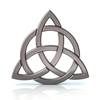A brief history of the Celts
You say Celts and immediately think of Ireland and Great Britain. In fact this connection has learned justifications, both historical and archaeological, even if the cradle of one of the peoples that between the IV and the I century B.C. scattered Europe along with the Romans and Germans, is to be found in a modest handful of territory that goes from the sources of the Rhine to those of the Danube, today distributed between Germany, France and Switzerland.
To certify it with a discreet safety were the results of the excavations conducted in the Swiss village of La Tène, where it was recovered a huge amount of material dating back to the Iron Age that proved that there had developed an autonomous civilization, completely different from those found in the surroundings. Within a few decades artifacts similar to those found in La Tène were found in many areas of Europe in such quantities as not to justify simple trade with the indigenous peoples: the Celts. The accuracy of the archaeological campaigns conducted in the twentieth century allowed to reconstruct most of their movements: initially they headed west, entering the present southern France and reaching the Iberian peninsula; from there they went up the French Atlantic coast until they reached the English Channel: part moved on the British Isles defying the waves on fragile boats, part instead headed inland, until the Germanic tribes let them pass.
Dating back to the tenth century B.C. is the penetration in Austria, Hungary and northern Italy: a vast territory, in which, however, the individual tribes developed characteristics gradually different from the original, ending up creating different communities for customs and traditions, while maintaining a common linguistic stock to refer to in trade exchange procedures.

THE ROMANS
Britons, Gauls, Celtiberians, Galatians, Helvetians, Pannons and Reti were peoples who subsequently came into contact with the Romans and were subjected to them, but they now possessed very different connotations. To reunify them under a single society the Romans, as by their old custom, did not let the conquered populations free to continue to practice their rites, worship their gods and perpetuate their traditions. Even so, syncretism ended up fading more and more their original characters, leading to the creation of general common traits that are at the basis of the development of our communities. An exception was represented by the Britons, who also thanks to the natural obstacles managed, although conquered by the Romans, to keep alive their specificities, first of all the language, which in those parts continued to be spoken while elsewhere predominated by Latin. Not even the successive invasions of the Germans were able to delete the original characters, to the point that today the only direct heirs of the Celts are considered the peoples of the British Isles, capable of preserving the Celtic language in the two Goidelic and Brittonic variants to this day.

CELTIC SOCIETY
Celtic society was centred on the patriarchal family, one in which a great old man ruled over all succeeding generations and shared with them all aspects of life, much as in the Scottish clans. Several families constituted tribes, at the head of which was appointed a king. All in all nothing new in the panorama of ancient protohistoric societies, except for the conditions of the woman: The Celts did not make any difference between man or woman and the rights were guaranteed to all and to all, to the point that it was not uncommon that some particularly charismatic female figures became queens or even carried out the most important priestly functions, those of the druids.
These were not merely the official link between the divine and the human worlds, but they represented the highest authority in the management of the natural order in communities where writing could not be used to fix once and for all the reference canons of science of the time and in which all knowledge was handed down mnemonically from druid to druid, so as to ensure the utmost respect and venerability to these figures.
Druids, and to a lesser extent bards, were also entrusted with the oral transmission of the most important mythological narratives, thanks to which it was possible to cement in the new generations the necessary sense of belonging to the community: of the Celtic literature of the origins we know little or nothing, while some information we have been able to recover from the stories later elaborated by the Irish tribes.

For centuries defined barbarians by their adversaries, Romans included, the Celts declined in all their variants were not at all crude and indeed distinguished in activities such as goldsmith and craftsmanship, thanks to which they managed to organize commercial trades with particularly consistent distant populations.
Architecture was not very developed, although today we do not have many remains that can give us a more precise idea of how to build their urban centers. Most of the ancient houses and public buildings found in the territories on which the Celts developed have been remodelled according to Roman taste and techniques: it is not by chance that going to France most of the examples of dwellings of the time is called Gallo: t is precisely because it is difficult to distinguish a sharp break between the two cultures.
Rather rudimentary also the precepts on which they based their economic policy, represented mostly by a substantial agricultural subsistence and some commercial exchange of the most sought-after handicraft products: however they were the incursions in the villages "enemies" to represent the greatest source of wealth for the Celtic tribes, seen that the power of their soldiers was such as to create problems also to armies much more structured, like the Roman one.
The legionaries could not do anything when in 390 B.C. the Gauls marched to Rome, on the so-called, famous "sack" : assaults and looting were their preferred strategies, but they managed little to do when it came to organize more structured war campaigns, during which they always remedied sound defeats. Of the Celtic culture something still remains to testify, however, the great influence that those populations had in the development of current European societies: and patience if someone has tried to distort some symbols by attributing them characteristics absolutely unknown at the time of birth.
Regardless of this, the Celtic was a social organization that managed to leave something of itself in its descendants. And that’s not to be underestimated.
Discover the magic of the Celts in our Celtic Collection



